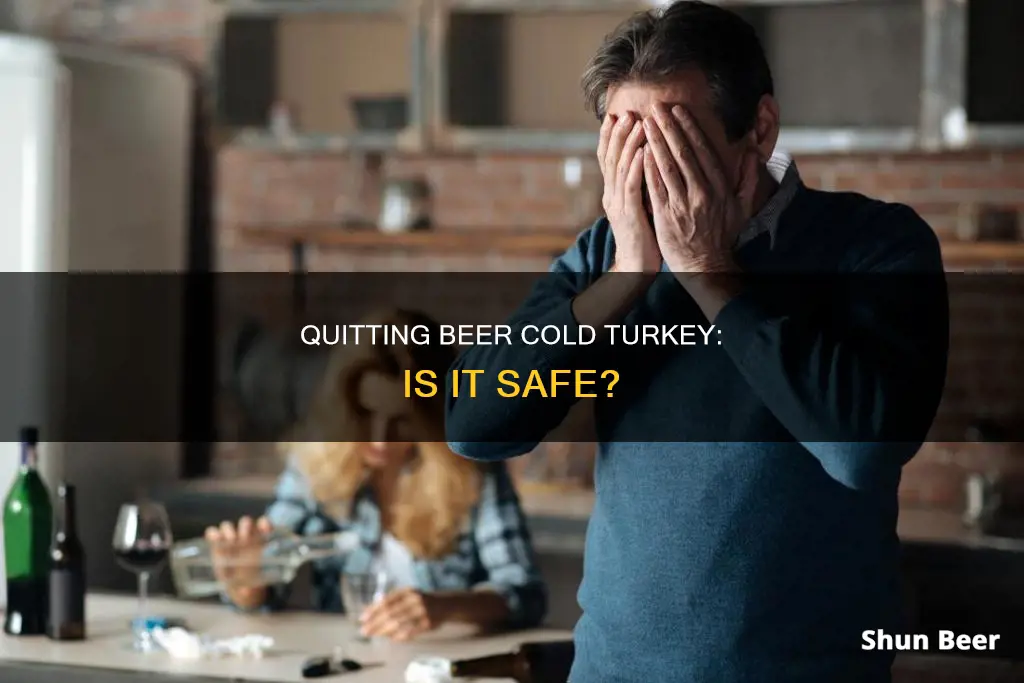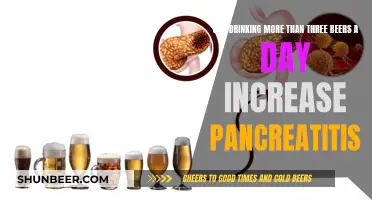
Quitting drinking is a positive step, but it's important to do it safely. While cold turkey may sound effective, it can be dangerous for people with alcohol dependence. Alcohol withdrawal symptoms can range from mild discomforts like sweating, nausea, and insomnia to severe complications like seizures, cardiac arrhythmias, and delirium tremens (DTs), which can be deadly. The severity of withdrawal depends on various factors, including the amount, frequency, and duration of alcohol consumption, as well as individual health factors. Medical detox, gradual reduction, and professional support are recommended for a safer withdrawal process.
| Characteristics | Values |
|---|---|
| Safety | Quitting drinking cold turkey is not safe and can lead to severe consequences and even death |
| Alcohol Withdrawal Syndrome | Symptoms include shaking, headache, high blood pressure, anxiety, increased heart rate, tachycardia, seizures, delirium tremens (DTs), cardiac complications, and death |
| Recommended Approach | Gradually decreasing alcohol consumption over time with the help of a professional recovery team |
| Detoxification Methods | Gradual reduction, tapering, and medical detoxification |
| Support | Support groups, counseling, therapy, nutritious diet, regular exercise, adequate sleep, and hydration |
What You'll Learn

Alcohol Withdrawal Syndrome
AWS occurs due to the body's physical dependence on alcohol, which is characterised by a high tolerance level and withdrawal symptoms upon cessation. The body adjusts to the continuous presence of alcohol and struggles to function normally without it. When the alcohol level suddenly drops, the brain stays in a keyed-up state, resulting in withdrawal.
The severity and length of AWS vary based on several factors, including the amount and duration of alcohol consumption, age, medical history, and coexisting health conditions. Symptoms typically begin within 6 to 24 hours of stopping or significantly decreasing alcohol use and can include anxiety, increased blood pressure and heart rate, high body temperature, and tremors. In severe cases, AWS can lead to seizures, DT, and even death.
The treatment for AWS aims to reduce withdrawal symptoms, prevent complications, and provide treatment options for alcohol use disorder. Mild to moderate AWS can be managed with medications such as carbamazepine or gabapentin, while severe or complicated AWS requires hospitalisation and continuous monitoring to prevent life-threatening complications. Benzodiazepines are often used as a first-line therapy to reduce the risk of seizures and DT.
It is important to note that quitting alcohol "cold turkey" can be risky due to severe withdrawal symptoms and potential complications. Seeking professional help and gradually reducing alcohol intake through medically-approved detoxification methods are safer alternatives.
Beer After the Sell-By Date: Is It Safe to Drink?
You may want to see also

Potential Risks and Complications
Quitting alcohol cold turkey can have severe health complications and risks. When someone with a drinking problem chooses to stop drinking, their body experiences withdrawal symptoms as it has become accustomed to the constant presence of alcohol and struggles to function normally without it.
The risks and complications of quitting alcohol cold turkey include:
- Alcohol Withdrawal Syndrome (AWS): This can range from mild discomforts like sweating, nausea, and insomnia to more severe complications like seizures and delirium tremens (DTs). DTs is a life-threatening condition characterised by confusion, hallucinations, and grand mal seizures. These symptoms typically peak within 48 to 72 hours but may persist for weeks.
- Cardiac issues: Abruptly quitting alcohol can lead to cardiac complications such as arrhythmias and a potentially fatal heart attack.
- Exacerbation of underlying health conditions: Withdrawal symptoms can aggravate pre-existing health issues, leading to serious health crises.
- Dehydration, electrolyte imbalances, and malnutrition: These issues are common during alcohol withdrawal and can lead to further medical complications, such as irregular heartbeats and Wernicke-Korsakoff syndrome (WKS).
- Relapse: The physical and psychological challenges of withdrawal are extremely difficult, and most people end up drinking again to ease the symptoms.
- Severe withdrawal symptoms: Heavy drinkers or those with a long history of alcohol consumption are at risk of developing severe withdrawal symptoms, including delirium tremens (DTs). These symptoms can be dangerous and life-threatening, and professional medical intervention is crucial in managing them effectively.
- Ketoacidosis: This condition is associated with the abrupt cessation of alcohol consumption and can lead to excessive thirst, fatigue, frequent urination, and vomiting.
- Death: In rare cases, untreated or inadequately managed withdrawal can lead to violent seizures, delirium tremens (DTs), and death.
Alabama's Beer Laws: Drinking While Driving
You may want to see also

The Risks of Going Cold Turkey
Quitting alcohol cold turkey can be a risky and dangerous decision that may lead to severe complications. Going cold turkey means stopping drinking without gradually reducing the amount or seeking professional help. While it may sound effective, it carries significant risks.
Withdrawal Symptoms
The body, accustomed to regular alcohol intake, can react negatively when deprived of it suddenly. Withdrawal symptoms can range from mild discomforts like sweating, nausea, insomnia, and anxiety to more severe complications like seizures and delirium tremens (DTs). DTs is a life-threatening condition characterized by confusion, hallucinations, high blood pressure, rapid heart rate, fever, and chest or stomach pains. These symptoms can peak within 48 to 72 hours and may persist for weeks.
Health Crises
The abrupt discontinuation of alcohol can exacerbate underlying health conditions, leading to serious health crises. Individuals with co-occurring physical or mental health disorders may be at higher risk of experiencing more severe withdrawal symptoms. Additionally, alcohol withdrawal can lead to dehydration, electrolyte imbalances, and malnutrition, which can cause further medical complications.
Cardiac Complications
Withdrawal from alcohol can cause cardiac complications such as arrhythmias (irregular heartbeat) and sudden death resulting from a heart attack. These complications can be life-threatening.
Relapse
Withdrawal is extremely difficult, both physically and psychologically. To ease the symptoms of sudden alcohol cessation, most people end up drinking again, often too much, and fall back into a pattern of consistent drinking.
Severe Complications
Quitting alcohol cold turkey can lead to severe and dangerous consequences. In addition to DTs, other potential complications include ketoacidosis, a condition that affects the pancreas' ability to produce insulin, and Wernicke-Korsakoff syndrome (WKS), a severe neurological disorder.
Due to these risks, experts do not recommend quitting alcohol cold turkey. Instead, it is much safer to gradually reduce alcohol consumption or seek medical detoxification with professional supervision.
Beer Drinking: What You Need to Know
You may want to see also

Detoxification Methods
Quitting alcohol cold turkey can be dangerous and lead to severe consequences. Alcohol withdrawal syndrome (AWS) is a set of symptoms that about half of individuals with an alcohol use disorder experience when they suddenly stop drinking or drastically reduce their alcohol intake. These symptoms include high blood pressure, nausea, vomiting, seizures, delirium tremens (DTs), and even death.
The severity of AWS depends on several factors, such as the amount, frequency, and duration of alcohol consumption. Older adults, those with a history of alcohol withdrawal seizures, and individuals with comorbid physical or mental health conditions are also at risk of experiencing more severe symptoms.
Due to the risks associated with alcohol withdrawal, it is recommended to gradually decrease alcohol consumption rather than quitting cold turkey. Medical detox, under the supervision of healthcare professionals, is the best way to ensure safety and comfort during the withdrawal process. This typically involves monitoring, medications, and other interventions to manage symptoms and prevent complications.
There are two main detoxification methods: inpatient and outpatient. Inpatient detoxification involves admitting the patient to a hospital or facility, providing constant medical care and supervision, and easy access to treatment for serious complications. It also removes the patient's access to alcohol and separates them from their substance-using environment. However, it is relatively more costly and may relieve patients of personal responsibilities, leading to unnecessary dependence on staff.
On the other hand, outpatient detoxification allows patients to continue their daily lives, maintain social support, and retain greater freedom. It is also less expensive and time-consuming. However, it carries an increased risk of relapse due to easy access to alcohol, and patients may be more likely to miss appointments or fail to complete detoxification.
The choice between inpatient and outpatient detoxification depends on the patient's specific needs and circumstances. Mild-to-moderate alcohol withdrawal syndrome can often be safely and effectively managed through outpatient detoxification, while inpatient care is recommended for those at risk of potentially life-threatening complications or with certain medical conditions.
During detoxification, medications are often provided to reduce withdrawal symptoms and prevent complications. Benzodiazepines are the most commonly used drugs, helping to calm the central nervous system and prevent seizures. Anticonvulsant medications may also be necessary for patients with a history of seizures. Additionally, counselling and education are important components to prepare patients for long-term treatment and recovery.
The goal of detoxification is to help patients achieve a substance-free state, relieve withdrawal symptoms, and address any medical or psychiatric conditions. This prepares patients for long-term treatment or rehabilitation, which focuses on maintaining an alcohol-free state and incorporating psychological, family, and social interventions to ensure lasting recovery.
Beer and Diatizem: What's the Verdict?
You may want to see also

Supportive Measures for Alcohol Withdrawal
Quitting alcohol can be challenging, and seeking professional help is always recommended. Here are some supportive measures to ease alcohol withdrawal symptoms:
- Nutrition: A nutritious diet is essential for improving physical health and fostering mental well-being. Malnutrition is common in those with alcohol use disorder, so it's crucial to address any nutritional deficiencies. Thiamine (vitamin B1) supplementation, for instance, can help prevent Wernicke-Korsakoff syndrome, a severe neurological condition.
- Hydration: Ensuring adequate hydration is vital during alcohol withdrawal. Dehydration can exacerbate withdrawal symptoms and negatively impact overall health.
- Sleep: Getting enough restorative sleep is crucial for managing alcohol withdrawal. Withdrawal can disrupt sleep patterns, so creating a calm and quiet environment can aid in improving sleep quality.
- Exercise: Regular physical activity can help reduce stress and improve overall well-being during the withdrawal process. However, it's important to start slowly and not overexert yourself, especially if you have experienced prolonged alcohol abuse.
- Support Groups: Joining support groups, such as Alcoholics Anonymous (AA), can provide a sense of community and solidarity. Sharing experiences and learning from others in similar situations can be beneficial for long-term recovery.
- Counselling and Therapy: Seeking professional counselling or therapy can offer emotional support and provide coping strategies to manage cravings and triggers. It can also help address any underlying mental health issues that may have contributed to alcohol dependence.
- Medication: In some cases, medication may be necessary to manage withdrawal symptoms. Benzodiazepines, for example, can help treat symptoms like anxiety, insomnia, and seizures. Anticonvulsants may also be prescribed to prevent seizures, especially in those with a history of withdrawal seizures.
- Tapering: Gradually reducing alcohol intake over time, known as tapering, allows the body to adjust to decreasing alcohol levels. This method can help minimise withdrawal symptoms and reduce the risk of severe complications.
- Medical Detoxification: Medical detox, conducted under professional supervision, is often recommended for those with severe alcohol dependence. It involves the use of medication to manage withdrawal symptoms, nutritional support, and counselling in a specialised facility.
Sun-Soaked Beer: Is It Safe to Drink?
You may want to see also
Frequently asked questions
"Cold turkey" means quitting a substance or behaviour abruptly, without any tapering or gradual reduction.
Alcohol withdrawal can cause severe symptoms and even be life-threatening. Withdrawal symptoms can range from mild discomforts like sweating, nausea, and insomnia to severe complications like seizures, delirium tremens (DTs), cardiac arrhythmias, and hyperthermia.
Those who have been drinking heavily and/or long-term, as well as older adults, those with a history of alcohol withdrawal seizures, and individuals with comorbid physical or mental health conditions.
It is much safer to gradually reduce your alcohol consumption over time, so your body can adjust to the decreasing levels of alcohol. Medical detoxification, conducted under professional supervision, is another recommended approach.
Quitting drinking (safely) may improve or reverse some of alcohol's negative effects on your physical health, including improving cognitive function, lowering blood pressure, reversing some forms of alcohol-related liver injury, and reducing the risk of certain cancers.







